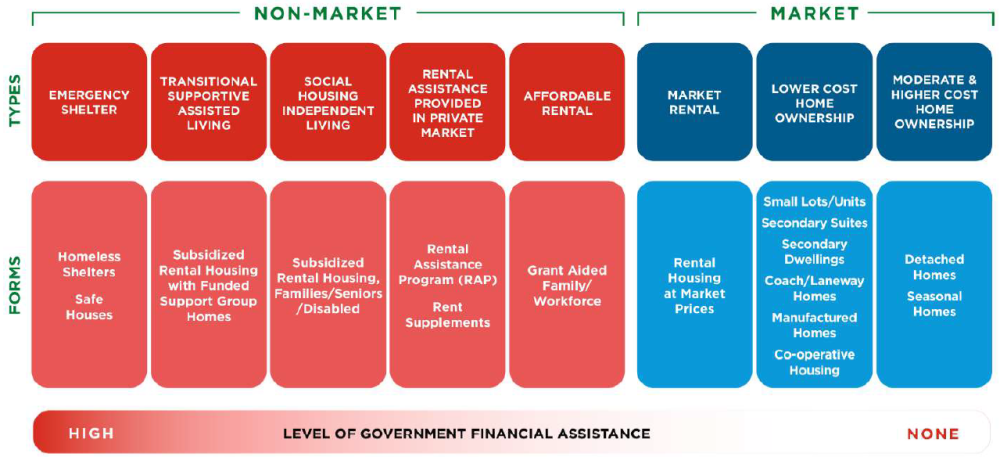Housing
The City of Kimberley recognizes the value and benefit for all citizens to have access to adequate and suitable housing. A diverse housing supply that can accommodate varying incomes, ages, abilities, and social needs helps to create and maintain an inclusive, equitable, and resilient community.
2024 Kimberley Housing Needs Report
Kimberley’s Interim Housing Needs Report (HNR) fulfills the minimum requirements under the Housing Needs Reports Regulation. The HNR report is intended to help the City and other housing stakeholders to better understand, respond to and plan for Kimberley’s 5- and 20-year housing needs. Kimberley’s report also includes additional analysis for a 10-year timeframe to identify both the 5- and 10-year needs distributed by housing type and tenure, income group, and household size (bedroom count). While recent construction activity is nearly on pace to meet initial five year estimated need, additional units, increased pace of construction and greater diversity of housing supply are clearly required as most of the recent new housing is of the market rental and ownership type.
In accordance with the province's proactive planning requirements, a review and update of Kimberley's OCP and zoning bylaws is required in 2025 to ensure that policies and regulations are aligned to meet identified 5-, 10- and 20-year housing needs. Of particular priority for consideration are strategies that support a significant increase in new units and a greater diversity of housing types, tenure and price range - specifically non-market rental units, deep subsidy and supportive rental units as well as units intended for lower-income households.
Following the next census in 2026, a full HNR update must be completed by Dec. 2028, followed by additional OCP and zoning updates by Dec. 2030. Moving forward, updates to the HNR, OCP and zoning are required every five years.
2021 Kimberley Housing Needs Assessment
Kimberley‘s previous Housing Needs Assessmentwas completed in 2021, key findings from the report include the identification of priority groups who disproportionately experience challenges accessing affordable and suitable housing, as well as gaps within the Kimberley housing landscape.
Rising housing costs and a lack of housing diversity have placed pressures on a range of households within the City. This is especially true for the priority groups, which includes seniors, low- and moderate-income households, families, and people with disabilities.
Addressing the priority groups' housing needs requires a greater representation of housing options across the housing continuum. Gaps in Kimberley's housing supply include non-market rental housing, low-end of market rental housing, market rental housing, supportive housing, and affordable home ownership. Developing diverse housing options would not only better serve the needs of the priority groups, but would benefit the community as a whole.
Priority Groups and Housing Gaps
Rising housing costs and a lack of housing diversity have placed pressures on a range of households within the City. This is especially true for the priority groups, which includes seniors, low- and moderate-income households, families, and people with disabilities.
Addressing the priority groups' housing needs requires a greater representation of housing options across the housing continuum. Current gaps in Kimberley's housing supply include non-market rental housing, low-end of market rental housing, market rental housing, supportive housing, and affordable home ownership. Developing diverse housing options would not only better serve the needs of the priority groups, but would benefit the community as a whole.

Financial Assistance for Housing
Provincial programs that supplement monthly rent payments, or fund renovations to support independent living at home are available for eligible BC residents. The Rental Assistance Program (RAP) and Shelter Aid for Elderly Renters (SAFER) programs, as an example, provide eligible low- and moderate-income households with monthly assistance to help with their monthly rent payments. The BC Rebate for Accessible Home Adaptations (BC-RAHA) is also available to support safe, independent living.